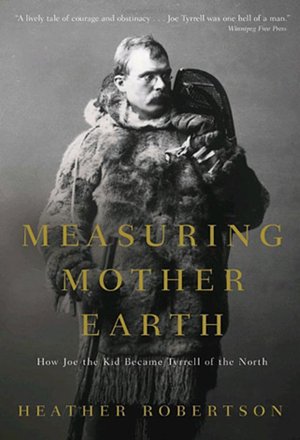Measuring Mother Earth:
How Joe the Kid Became Tyrrell of the North

Support Canada's History in other ways (more)
by Heather Robertson
McClelland and Stewart, Toronto, 2007
360 pp., illus., $34.99 hardcover
Joseph Burr Tyrrell was undoubtedly one of the iconic figures associated with the opening of the Canadian Northwest at the end of the nineteenth century. After all, how many naturalists, geologists, and explorers can claim the discovery of Canada’s first dinosaur fossil, the mapping of undiscovered country in the Far North, pioneering work on glacial history, and the accumulation of a small fortune in mining development as part of their resumé?
But as the prolific author Heather Robertson makes clear in her recent biography, the mythic Tyrrell of the North was largely a fabrication of biographer William J. Louden’s 1930 portrait A Canadian Geologist (which Tyrrell clandestinely co-authored) and of subsequent fawning magazine articles (including one in this publication in December 1952) that fed the public appetite for heroic figures who prevailed in the struggle to tame the Canadian North.
Robertson paints a much less flattering though nonetheless fascinating portrait of a man whose life was marked by personal and professional failure. Tyrrell failed to produce complete maps or meaningful geological data on his storied expeditions through the eastern Arctic in the 1890s on behalf of the Geological Survey of Canada, relying instead on the ingenuity of his guides merely to survive. He speculated in mine properties from the Klondike to the gold and silver belts of northern Ontario, nearly ruining his family finances many times while somehow failing to notice rich ore bodies that others discovered only months later.
An extremely self-absorbed man, Tyrrell refused to lend one hundred dollars to his brother James (who had provided indispensable assistance on the northern journeys) as hard times hit during the Depression. His erratic business dealings and frequent absences placed an almost intolerable strain not only on his relationships to his wife Dollie and his children, but also on those with his colleagues. He faced bitter shareholder and management revolts while at the helm of his Kirkland Lake mining operation.
Even the dinosaur discovery hid a tragic failure: Tyrrell’s inexperience and haste to retrieve his valuable find resulted in the shattering of the fossilized skull. If Robertson’s biography was simply the story of this one man’s grim failings, it might prove a difficult read. Yet her work captures brilliantly both the spirit of boosterism and the amateurism associated with the opening of northern Canada. In this age of hyper-credentialism, it is difficult to imagine that a man such as Tyrrell could practise archaeology, geology, and mine engineering with no training in any of these fields, but such was the freewheeling nature of business development in the hinterland of a relatively young and underpopulated country. Robertson’s account of the big schemes and failed dreams of these heady times is both evocative and very entertaining.
On a more intimate scale, Robertson’s adroit use of Tyrrell’s family letters provides a revealing portrait of a man determined to make it big on the fringes of Canada’s northern development empire. Although Robertson at times uses too many overly long quotes, her own vivid writing nevertheless reveals the inner world of this most complex and contradictory hero of the northern exploration period.
Measuring Mother Earth is a valuable and highly readable revision of the myth accorded Joseph Tyrrell as a pioneering figure in the history of northern development. Robertson not only effectively captures the life of a fascinating individual, she has made an important contribution to the growing number of popular and academic histories that analyze the origins of the development ethos in the Canadian North.
— John Sandlos (Read bio)
Assistant professor of history at Memorial University of Newfoundland. His research interests include environmental history, aboriginal people and conservation, and mining in northern Canada.